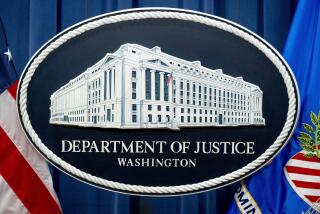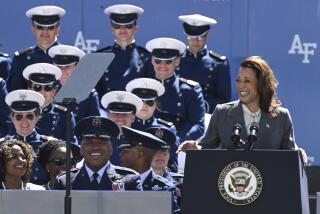U.S. to Send Top-Level Delegation to N. Korea
- Share via
WASHINGTON — The United States will send the highest-level delegation in nearly half a century to North Korea next week, in hopes of charting a new relationship with one of the world’s most isolated and authoritarian regimes, Secretary of State Madeleine Albright said Thursday.
Former U.S. Defense Secretary William J. Perry, a special White House envoy, will carry a letter from President Clinton when he leads a seven-member team to North Korea’s capital, Pyongyang, for a four-day visit beginning Tuesday. Perry met Thursday with Clinton for a final briefing.
The trip has been in the works for weeks, but the announcement was delayed until several hours after a 14-member American technical team had successfully completed its first inspection of a suspected North Korean nuclear facility at Kumchangri.
Perry’s mission represents a dramatic attempt to reach out to Pyongyang’s enigmatic leadership. But it also reflects mounting White House and congressional frustration in dealing with an unpredictable regime that is heavily armed and that directly threatens South Korea and Japan, as well as U.S. troops in northeast Asia.
“We looked at continuing our policy and just muddling through,” a senior Clinton administration official explained. “We were facing a situation where we were going from crisis to crisis, event to event, situation to situation.”
Instead, Perry will “lay out a pathway” for improving relations through “mutual threat reduction,” the official said. Among other issues, he will propose that both Koreas agree to limit the range and payload of their missile forces.
“We don’t go in a position of trust,” the official added. “We go in a position of great skepticism. But we do see the possibility of fundamental change.”
The official said it “would be appropriate” for the group--which will include the most senior U.S. government officials to visit North Korea since the Korean War ended in 1953--to meet with the country’s reclusive leader, Kim Jong Il, but that it is not a precondition for the trip.
“The letter from the president will explain why he is sending Dr. Perry. . . . [It] notes the support of our allies and explains what we hope a more positive future might be between our two countries,” the official said.
North Korea repeatedly has demanded that Washington drop sweeping economic and other sanctions first imposed in 1950. The U.S. web of embargoes is based on laws that bar trading with the enemy, with a state that supports terrorism, and with a nation that exports missiles and other dangerous technology in defiance of international regimes.
The administration official who briefed reporters declined to say whether the Perry team will discuss easing the embargoes or normalizing relations when it meets with the North Koreans.
Legislation introduced Wednesday by a bipartisan group in the House would require the economic embargo to remain in effect until “North Korea terminates its long-range missile program and ceases all efforts to export such missiles.”
The U.S. team that began inspections Thursday took measurements and shot videos of a huge hole at Kumchangri and planned to stay at the remote mountainous site until the weekend. The State Department declined to say what the group found, however, and whether the inspectors confirmed U.S. suspicions about the underground blast site.
Washington spent months negotiating for access to Kumchangri after satellite photos and other intelligence last summer indicated that it could be designed to hide a facility that processed plutonium for nuclear weapons.
Although the administration flatly rejected Pyongyang’s demand of $300 million in exchange for permission to inspect the site, it agreed in March to sharply increase food aid to North Korea, which has suffered severe food shortages caused by drought, floods and poor agricultural policies. By some accounts, as many as 2 million people have died of starvation in the last four years.
So far this year, the administration has announced it will donate 600,000 tons of corn, rice and other food to North Korea, making the rogue Stalinist regime one of America’s largest recipients of humanitarian aid. U.S. technicians also have gone to North Korea to help plan pilot projects for growing potatoes.
Rep. Benjamin A. Gilman (R-N.Y.), chairman of the House International Relations Committee, sharply criticized the Kumchangri access deal as a “failure” of U.S. policy. He said the administration had given $180 million in food aid “for entrance to this sure to be empty facility.”
Accusations last year that North Korea was building the Kumchangri facility to secretly produce nuclear weapons materials, as well as its unexpected test launch in August of an advanced three-stage missile over Japan, put a harsh spotlight on U.S. policies toward Pyongyang.
The Perry group will depart Saturday for Tokyo and meetings with Japanese and South Korean officials, and will stop in Seoul for further meetings with regional allies on the way home. Perry will present his findings to the White House after his return.
More to Read
Sign up for Essential California
The most important California stories and recommendations in your inbox every morning.
You may occasionally receive promotional content from the Los Angeles Times.














